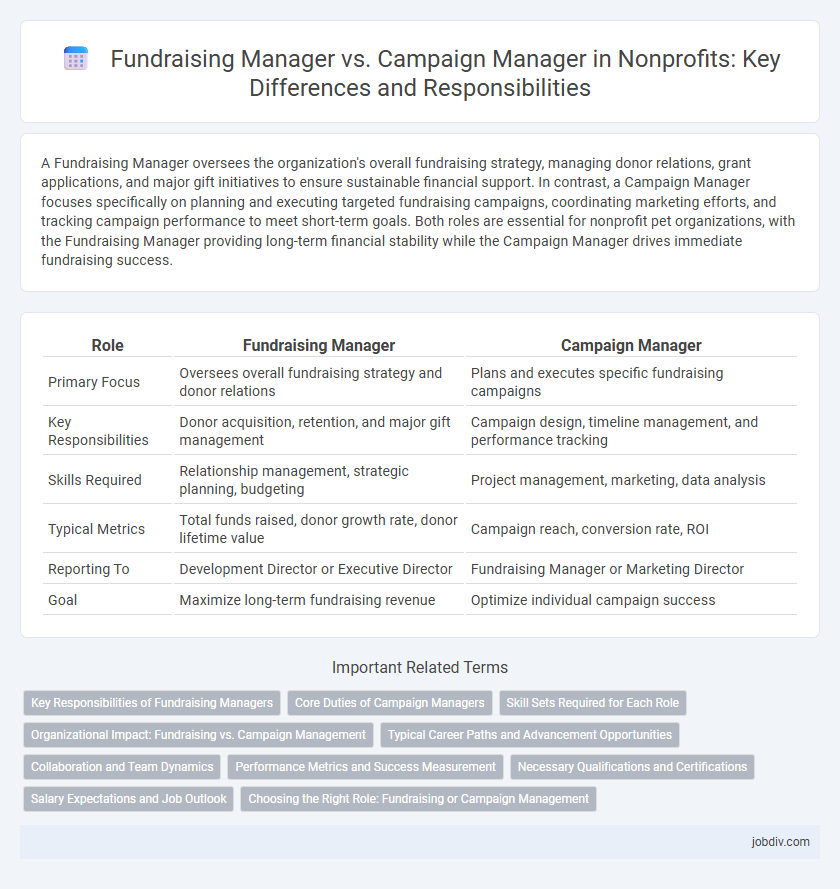A Fundraising Manager oversees the organization's overall fundraising strategy, managing donor relations, grant applications, and major gift initiatives to ensure sustainable financial support. In contrast, a Campaign Manager focuses specifically on planning and executing targeted fundraising campaigns, coordinating marketing efforts, and tracking campaign performance to meet short-term goals. Both roles are essential for nonprofit pet organizations, with the Fundraising Manager providing long-term financial stability while the Campaign Manager drives immediate fundraising success.
Table of Comparison
| Role | Fundraising Manager | Campaign Manager |
|---|---|---|
| Primary Focus | Oversees overall fundraising strategy and donor relations | Plans and executes specific fundraising campaigns |
| Key Responsibilities | Donor acquisition, retention, and major gift management | Campaign design, timeline management, and performance tracking |
| Skills Required | Relationship management, strategic planning, budgeting | Project management, marketing, data analysis |
| Typical Metrics | Total funds raised, donor growth rate, donor lifetime value | Campaign reach, conversion rate, ROI |
| Reporting To | Development Director or Executive Director | Fundraising Manager or Marketing Director |
| Goal | Maximize long-term fundraising revenue | Optimize individual campaign success |
Key Responsibilities of Fundraising Managers
Fundraising Managers develop and implement strategic plans to secure financial support, managing donor relations and organizing fundraising events to maximize contributions. They analyze fundraising data to optimize campaigns and maintain compliance with nonprofit regulations. Their key responsibilities include cultivating donor networks, overseeing grant applications, and coordinating fundraising initiatives to ensure sustainable revenue growth.
Core Duties of Campaign Managers
Campaign Managers in nonprofits primarily design, implement, and oversee fundraising campaigns to maximize donor engagement and revenue generation. They coordinate marketing efforts, track campaign performance metrics, and manage communication strategies targeting specific donor segments. Their core duties emphasize strategic planning, stakeholder collaboration, and ensuring campaign goals align with the organization's mission and fundraising objectives.
Skill Sets Required for Each Role
Fundraising Managers must excel in donor relationship management, grant writing, and data analysis to optimize fundraising strategies. Campaign Managers require strong project management skills, social media expertise, and creative content development to drive successful outreach and engagement. Both roles benefit from excellent communication skills but focus on different aspects of nonprofit growth and donor interaction.
Organizational Impact: Fundraising vs. Campaign Management
Fundraising Managers drive organizational growth by securing sustainable financial resources through donor cultivation, grant writing, and event planning, directly impacting budget stability and long-term program funding. Campaign Managers focus on strategic communication, volunteer coordination, and outreach efforts to mobilize support for specific initiatives, enhancing public engagement and mission visibility. The coordinated efforts between Fundraising and Campaign Managers optimize resource allocation, amplify campaign success, and elevate overall nonprofit impact.
Typical Career Paths and Advancement Opportunities
Fundraising Managers typically advance by gaining expertise in donor relations, grant writing, and event planning, often progressing to roles such as Development Director or Chief Development Officer. Campaign Managers generally develop skills in strategic planning, communications, and team leadership, positioning themselves for advancement to Marketing Director or Executive Director roles. Both career paths offer opportunities to influence nonprofit growth but focus on distinct aspects of organizational success.
Collaboration and Team Dynamics
Fundraising Managers and Campaign Managers collaborate closely to drive nonprofit success by aligning donor engagement strategies with campaign goals. Effective team dynamics emerge when Fundraising Managers leverage donor insights while Campaign Managers focus on messaging and outreach coordination. This synergy enhances resource allocation, maximizes fundraising outcomes, and strengthens overall campaign impact.
Performance Metrics and Success Measurement
A Fundraising Manager's performance is primarily measured by total funds raised, donor retention rates, and average donation size, reflecting their ability to cultivate long-term donor relationships and maximize revenue streams. A Campaign Manager's success hinges on metrics like campaign reach, engagement rates, conversion ratios, and the achievement of specific campaign goals, emphasizing effective communication and audience targeting. Both roles require tracking ROI, but Fundraising Managers focus on broader fiscal sustainability, while Campaign Managers prioritize tactical execution and message impact.
Necessary Qualifications and Certifications
Fundraising Managers often require certifications such as Certified Fund Raising Executive (CFRE) to demonstrate expertise in donor relations, financial planning, and ethical fundraising practices. Campaign Managers typically need skills in project management and communication, with certifications like Project Management Professional (PMP) being advantageous to oversee campaign strategy and execution effectively. Both roles benefit from strong leadership abilities and experience in nonprofit operations, but Fundraising Managers focus more on donor engagement and revenue generation qualifications.
Salary Expectations and Job Outlook
Fundraising Managers typically earn a median salary of $70,000 to $90,000 annually, reflecting their strategic role in donor relations and revenue growth for nonprofits, while Campaign Managers' salaries range from $55,000 to $80,000, emphasizing project management and outreach execution. The job outlook for Fundraising Managers is strong, with a projected growth rate of 9% through 2030 due to increasing reliance on philanthropic support, whereas Campaign Managers may experience a steadier demand aligned with nonprofit campaigning cycles. Both positions require distinct skills in leadership and communication, with salary expectations influenced by organization size, location, and fundraising budget.
Choosing the Right Role: Fundraising or Campaign Management
Choosing between a Fundraising Manager and a Campaign Manager hinges on organizational goals; Fundraising Managers specialize in securing donations through donor relations and grant writing, while Campaign Managers focus on strategizing and executing advocacy or awareness campaigns. Fundraising Managers optimize revenue generation and donor stewardship, essential for financial sustainability, whereas Campaign Managers drive engagement and public support, critical for mission visibility and action. Aligning the role with your nonprofit's immediate priorities--financial growth or campaign impact--ensures effective resource allocation and mission advancement.
Fundraising Manager vs Campaign Manager Infographic

 jobdiv.com
jobdiv.com